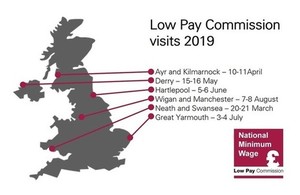Low Pay Commission's 2019 visits announced
LPC to gather evidence on the effects of the minimum wage in Neath and Swansea, Ayr and Kilmarnock, Derry, Hartlepool, Great Yarmouth, and Wigan and Manchester.

2019 visits map
The Low Pay Commission (LPC) has announced its visits programme for 2019. It is looking to meet businesses and workers affected by the National Minimum Wage and National Living Wage.
Commissioner Professor Sarah Brown said:
These visits are a vital part of our evidence base - talking to employers and employees allows us to find out what is going on more quickly and to gather more detail than aggregate statistics can ever tell us.
The LPC organises an annual programme of visits to gather evidence in support of its recommendations to government. The visits are attended by members of the Commission and LPC Secretariat. The purpose of the visits is to hear first hand evidence from employers, workers and anyone else with a view on the National Minimum Wage rates and their effects.
The visit locations were chosen because most have a higher than average proportion of workers paid the minimum wage. The LPC also seeks to visit a combination of cities and more rural areas, and places with a different industrial make-up, to gain a rounded view of the effects of the minimum wage across the UK.
On the visits, the LPC hosts meetings and travels to businesses and workers at their place of work to see the effects of the minimum wage ‘on the ground’. Meetings with colleges, public sector organisations and charities are also welcomed.
2019 visit locations
| 20-21 March | Neath and Swansea |
| 10-11 April | Ayr and Kilmarnock |
| 15-16 May | Derry |
| 5-6 June | Hartlepool |
| 3-4 July | Great Yarmouth |
| 7-8 August | Wigan and Manchester |
Contact the LPC for more information or to arrange a meeting in any of the locations
Press enquiries
Low Pay Commission Ground Floor 10 South Colonnade Canary Wharf
London
E14 4PU
Current and future minimum wage rates
| Current rate | Future rate (from April 2019) | Increase | |
|---|---|---|---|
| NLW | £7.83 | £8.21 | 4.9% |
| 21-24 rate | £7.38 | £7.70 | 4.3% |
| 18-20 rate | £5.90 | £6.15 | 4.2% |
| 16-17 rate | £4.20 | £4.35 | 3.6% |
| Apprentice rate | £3.70 | £3.90 | 5.4% |
| Accommodation offset | £7.00 | £7.55 | 7.9% |
Notes
- The Low Pay Commission is an independent body made up of employers, trade unions and experts whose role is to advise the Government on the minimum wage. The LPC’s 2018 Report was published on gov.uk on Tuesday 27 November. Evidence gathered on previous visits contributed to the 2018 report.
- The National Living Wage is the statutory minimum wage for workers aged 25 and over. It was introduced in April 2016 and has a target of 60% of median earnings by 2020, subject to sustained economic growth. The April 2019 increase will maintain the path to this target.
- Different rates apply to 21-24 year olds, 18-20 year olds, 16-17 year olds and apprentices aged under 19 or in the first year of an apprenticeship.
- Rates for workers aged under 25, and apprentices, are lower than the NLW in reflection of lower average earnings and higher unemployment rates. International evidence also suggests that younger workers are more exposed to employment risks arising from the pay floor than older workers. Unlike the NLW (where the possibility of some consequences for employment have been accepted by the Government), the LPC’s remit requires us to set the rates for younger workers and apprentices as high as possible without causing damage to jobs and hours.
- The Accommodation Offset is an allowable deduction from wages for accommodation, applicable for each day of the week. In April 2019 it will increase to £7.55 per day.
- The National Living Wage is different from the UK Living Wage and the London Living Wage. Differences include that: the UK Living Wage and the London Living Wage are voluntary pay benchmarks that employers can sign up to if they wish, not legally binding requirements; the hourly rate of the UK Living Wage and London Living Wage is based on an attempt to measure need, whereas the National Living Wage is based on a target relationship between its level and average pay; the UK Living Wage and London Living Wage apply to workers aged 18 and over, the National Living Wage to workers aged 25 and over. The Low Pay Commission has no role in the UK Living Wage or the London Living Wage.
- The nine Low Pay Commissioners are:
- Bryan Sanderson
- Professor Sarah Brown
- Professor Richard Dickens
- Kate Bell
- Kay Carberry
- Simon Sapper
- Neil Carberry
- Clare Chapman
- Martin McTague